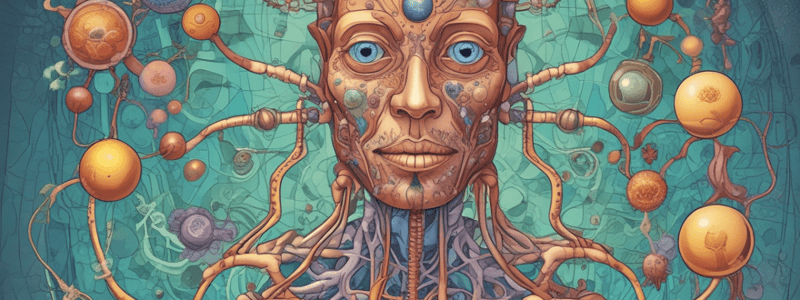Podcast
Questions and Answers
Which type of immunity is associated with the classical pathway?
Which type of immunity is associated with the classical pathway?
- Innate
- Acquired (correct)
- Passive
- Adaptive
Which complement component does the alternative pathway activation bypass?
Which complement component does the alternative pathway activation bypass?
- C3
- C5
- C9
- C4 (correct)
What initiates the lectin pathway?
What initiates the lectin pathway?
- Antigen-antibody complex
- Microbial surface molecules
- Mannose residue on the surface of microorganisms (correct)
- Lipopolysaccharides
Which component acts as an opsonin in the complement system?
Which component acts as an opsonin in the complement system?
Which of the following is considered an anaphylatoxin?
Which of the following is considered an anaphylatoxin?
Which pathway activation involves all components starting with C1?
Which pathway activation involves all components starting with C1?
What happens to complement proteins when they are cleaved during activation?
What happens to complement proteins when they are cleaved during activation?
Which pathway of the complement system is initiated by mannan-binding lectin (MBL)?
Which pathway of the complement system is initiated by mannan-binding lectin (MBL)?
Which complement components are directly involved in the formation of the membrane attack complex (MAC)?
Which complement components are directly involved in the formation of the membrane attack complex (MAC)?
How does the classical pathway of complement activation begin?
How does the classical pathway of complement activation begin?
In which locations is the complement system synthesized?
In which locations is the complement system synthesized?
Which components of the complement system are bypassed in the alternative pathway?
Which components of the complement system are bypassed in the alternative pathway?
Which complement fragment is typically involved in enhancing inflammatory processes?
Which complement fragment is typically involved in enhancing inflammatory processes?
Which pathway involves the direct binding of complement to the surface of infectious agents?
Which pathway involves the direct binding of complement to the surface of infectious agents?
Flashcards are hidden until you start studying
Study Notes
The Complement System
- Comprised of approximately 20 proteins, including C1, C2, and C3, which exist in an inactive state in the plasma and must be cleaved to form active enzymes.
Synthesis and Activation
- Synthesis occurs in the liver, intestinal cells, and macrophages.
- Activation occurs sequentially in a cascading manner, with each protein activating the next protein in the sequence.
- Complement activation can occur through the classical, lectin, or alternative pathways, all leading to the production of C3b.
Complement Activation Pathways
-
Classical Pathway:
- Initiated by antigen-antibody complexes, specifically IgG and IgM.
- Activated by the binding of the Fc portion of the antibody molecule to specific cellular antigens.
- C1 is activated, followed by C4, C2, and C3, leading to the formation of the membrane attack complex (C5b6789).
-
Alternative Pathway:
- Activated in the absence of antibody, directly binding to the surface of infectious agents, such as bacterial endotoxins and fungal zymosan cell wall.
- Bypasses C1, C4, and C2, directly activating C3 through the properdin system, followed by the activation of C5 and the formation of the membrane attack complex (C5b6789).
-
Lectin Pathway:
- Initiated by mannan-binding lectin (MBL), produced by the liver, which binds to carbohydrate on pathogen surfaces.
- Activates C2 and C4, followed by the classical pathway.
Differences between the Classical, Alternative, and Lectin Pathways
- Classical Pathway: Acquired immunity, initiated by antigen-antibody complex, and activates all components starting with C1.
- Alternative Pathway: Innate immunity, initiated by microbial surface molecules, and bypasses C1, C4, and C2, starting with C3.
- Lectin Pathway: Innate immunity, initiated by mannose residue on the surface of microorganisms, and activates all components except C1.
Biological Activities of the Complement
- Cell Lysis: Occurs when the antigen is on the cell wall of bacteria or cells, such as RBCs, graft cells, or tumor cells, leading to the disruption of the cell membrane and lysis.
- Opsonization: C3b acts as an opsonin, enhancing the phagocytosis of cells and antigen-antibody complexes.
- Inflammatory Reactions:
- C3a is chemotactic, attracting neutrophils and macrophages to the site of inflammation.
- C3a, C4a, and C5a are anaphylatoxins, causing degranulation of mast cells and release of histamine and other inflammatory mediators, promoting the inflammatory reaction.
Studying That Suits You
Use AI to generate personalized quizzes and flashcards to suit your learning preferences.




